Introduction
What Kind Of Lettuce Can Rabbits Eat: Welcome to a guide dedicated to the health and well-being of your furry friends! As responsible rabbit owners, it’s crucial to ensure that your beloved companions receive a balanced and appropriate diet. One of the key components of their nutrition is the type of lettuce they consume. While rabbits are known for their love of leafy greens, not all varieties of lettuce are safe or suitable for their consumption. In this informative exploration, we’ll delve into the world of lettuce and rabbits, uncovering the kinds of lettuce that are not only safe but also nutritious for your adorable, hop-happy companions. Whether you’re a new rabbit owner seeking guidance or a seasoned caregiver looking to refine your pets’ diet, understanding what kind of lettuce rabbits eat is an essential step towards ensuring their happiness and longevity.
Rabbits have sensitive digestive systems, and certain types of lettuce can cause digestive issues, such as diarrhea or even more serious problems. The general guideline is to offer darker, nutrient-rich lettuces in moderation while avoiding those with high water content and lower nutritional value.
When introducing lettuce or any new food to your rabbits’ diet, start with a small amount and observe how they react. Gradually increase the portion size if they tolerate it well. Always wash the lettuce thoroughly to remove any pesticides or contaminants.
Remember that while lettuce can be a healthy treat, it should not be the sole component of your rabbits’ diet. Hay is a staple food for rabbits, providing essential fiber for their digestive health. Fresh vegetables, including safe lettuces, can complement their diet along with a small amount of rabbit pellets.

Can rabbits eat all types of lettuce?
Some lettuce is ‘worse’ than others – light-coloured varieties are high in water and have very little nutritional value, so are not recommended. You can feed darker, more leafy and fibrous varieties (e.g. romaine lettuce) to your rabbit, as these are higher in fibre and actual nutrients.
Safe Lettuce Varieties
Romaine Lettuce: This variety is often considered one of the safest options for rabbits. It has a higher fiber content and lower water content compared to other types, making it a good choice for maintaining a rabbit’s digestive health.
Green Leaf Lettuce: Another safe option, green leaf lettuce is rich in fiber and nutrients that can benefit rabbits. It’s important to note that moderation is key, as too much lettuce of any type can lead to digestive issues.
Moderate Consumption
Red Leaf Lettuce: While red leaf lettuce is generally safe for rabbits, it has a slightly higher water content and lower nutritional value compared to romaine and green leaf lettuce. It can be given in moderation.
Butterhead Lettuce: This variety is softer and contains higher water content, which means it should be given in smaller amounts. Too much butterhead lettuce might cause loose stools.
Lettuce to Avoid
Iceberg Lettuce: Iceberg lettuce has very low nutritional value and is primarily composed of water. It lacks the necessary fiber and nutrients for a rabbit’s diet and should be avoided as a regular food source.
Spinach and Other Dark Greens: While spinach and other dark greens like kale and Swiss chard are nutritious, they are also high in oxalic acid, which can hinder calcium absorption and potentially lead to health issues if consumed excessively.
What lettuce can rabbits not eat?
While there are several varieties of dark, leafy lettuces (like romaine and green leaf) that make wonderful staples in a well-balanced rabbit diet, light-colored lettuces, like iceberg, contain a chemical called lactucarium that can be harmful to rabbits if ingested in large quantities.
Iceberg Lettuce
Iceberg lettuce is one of the most commonly found types in grocery stores, but it’s one that rabbits should not consume. This lettuce variety has a high water content and lacks the necessary fiber and nutrients that rabbits need. Feeding rabbits excessive iceberg lettuce can lead to digestive issues like diarrhea, as it doesn’t provide the necessary roughage for their gut health.
Spinach
Spinach is a leafy green known for its nutrient content, but it contains high levels of oxalic acid. Oxalic acid can interfere with calcium absorption and contribute to the formation of kidney stones in rabbits. While small amounts of spinach are unlikely to cause harm, it’s best to avoid feeding it regularly.
Kale and Swiss Chard
Similar to spinach, kale and Swiss chard are also high in oxalic acid. These dark leafy greens can negatively impact a rabbit’s calcium balance if consumed excessively. It’s advisable to limit their consumption or choose alternative greens with lower oxalic acid content.
Arugula
Arugula, though popular in salads, is not ideal for rabbits. It can be too spicy and might cause digestive upset in rabbits, leading to discomfort and diarrhea. Opt for milder greens that are better suited to their digestive systems.
Cabbage and Brussels Sprouts
Cabbage and Brussels sprouts contain compounds that can cause gas and bloating in rabbits. Feeding these vegetables in excess may result in gastrointestinal discomfort and should be avoided.
What kind lettuce can rabbits eat?
You can feed your pet rabbit darker and leafier types of lettuce. This includes cos (aka. romaine), loose leaf and butterhead lettuce. These contain more nutritional value including vitamins A, C, K and fibre.
Romaine Lettuce (Lactuca sativa)
Romaine lettuce is considered one of the best lettuce options for rabbits. It has a higher fiber content and lower water content compared to other varieties, making it an excellent choice for promoting healthy digestion. Its crisp leaves also provide rabbits with the necessary chewing exercise to maintain dental health.
Green Leaf Lettuce (Lactuca sativa var. crispa)
Green leaf lettuce is another safe option for rabbits. It is rich in fiber, vitamins, and minerals that contribute to a rabbit’s overall well-being. The tender leaves are easy for rabbits to chew and digest, making it a great addition to their diet.
Red Leaf Lettuce (Lactuca sativa var. crispa)
Red leaf lettuce, while safe, should be fed in moderation due to its slightly higher water content. Its colorful leaves provide visual variety in a rabbit’s diet and can be a tasty treat when offered occasionally.
Butterhead Lettuce (Lactuca sativa var. capitata)
Butterhead lettuce is acceptable for rabbits, but like red leaf lettuce, it should be given in moderation due to its higher water content. Its soft leaves can be a pleasant change from the crunchier varieties, offering rabbits a different texture to explore.
Bibb Lettuce (Lactuca sativa var. capitata)
Bibb lettuce, similar to butterhead lettuce, is safe for rabbits when fed sparingly. Its tender leaves are easy to chew, making it a gentle option for rabbits with dental sensitivities.
Can rabbits eat regular lettuce?
Yes, rabbits can eat lettuce, but it should be fed in moderation. Lettuce is low in nutritional value and can cause digestive upset if fed in large quantities. Once or twice a week is more than enough. There are many other fresh, healthier vegetable leaves and tops that rabbits enjoy eating.
Romaine Lettuce (Lactuca sativa var. longifolia)
Romaine lettuce is generally considered safe and suitable for rabbits. Its higher fiber content and lower water content make it a favorable option for maintaining digestive health. Rabbits can enjoy romaine lettuce in moderation as part of their diet.
Green Leaf Lettuce (Lactuca sativa var. crispa)
Green leaf lettuce is another variety that rabbits can consume. Its tender leaves are easy for rabbits to chew and digest, and it provides valuable nutrients such as fiber and vitamins.
Red Leaf Lettuce (Lactuca sativa var. crispa)
Red leaf lettuce can be fed to rabbits in moderation. Its colorful leaves add visual variety to their diet, but its slightly higher water content means it should not be the primary food source.
Butterhead Lettuce (Lactuca sativa var. capitata)
Butterhead lettuce is safe for rabbits, but due to its higher water content and lower fiber content, it should be given sparingly. Including it occasionally can provide rabbits with a change in texture.
Iceberg Lettuce (Lactuca sativa var. capitata)
Iceberg lettuce, often considered “regular lettuce,” is one variety that should be avoided. It contains minimal nutritional value and high water content, which can lead to digestive upset in rabbits if consumed in excess.
Which is the Favourite vegetable of rabbit?
Particularly good vegetables include the dark leafy greens like romaine lettuce, bok choy, mustard greens, carrot tops, cilantro, watercress, basil, kohlrabi, beet greens, broccoli greens, and cilantro.
Carrots: A Classic Favorite
Carrots are iconic rabbit treats that are widely adored. The natural sweetness and satisfying crunch make carrots a hit among rabbits. However, it’s important to feed carrots in moderation due to their sugar content. Offering small, bite-sized pieces as occasional treats can keep your rabbit’s diet balanced.
Bell Peppers: A Colorful Delight
Bell peppers, especially the red and green varieties, are often enjoyed by rabbits. The vibrant colors and crisp texture make them appealing to rabbits, while the high vitamin C content provides a nutritional boost.
Broccoli Florets: A Tasty Variation
Broccoli florets, when offered in moderation, can be a welcomed addition to a rabbit’s diet. The florets provide a different texture for rabbits to explore, and their nutrient profile offers valuable vitamins and minerals.
Celery: A Refreshing Option
Celery is another vegetable that some rabbits enjoy. Its high water content provides hydration, and the fibrous stalks can help promote dental health as rabbits chew on them.
Zucchini and Cucumber: Light and Hydrating
Zucchini and cucumber are hydrating vegetables that rabbits might find appealing, particularly during warmer months. Their mild flavors and high water content can be a refreshing addition to a rabbit’s diet.
Can rabbits eat store bought lettuce?
This may come as a shock, but you should avoid feeding your rabbit light-colored lettuce, including iceberg, as it can contain lactucarium, a chemical that can be harmful to your bunny’s health if ingested. Iceberg lettuce also contains mostly water and will add little to no nutrition to a diet.
Carrots: A Classic Favorite
Carrots are iconic rabbit treats that are widely adored. The natural sweetness and satisfying crunch make carrots a hit among rabbits. However, it’s important to feed carrots in moderation due to their sugar content. Offering small, bite-sized pieces as occasional treats can keep your rabbit’s diet balanced.
Bell Peppers: A Colorful Delight
Bell peppers, especially the red and green varieties, are often enjoyed by rabbits. The vibrant colors and crisp texture make them appealing to rabbits, while the high vitamin C content provides a nutritional boost.
Broccoli Florets: A Tasty Variation
Broccoli florets, when offered in moderation, can be a welcomed addition to a rabbit’s diet. The florets provide a different texture for rabbits to explore, and their nutrient profile offers valuable vitamins and minerals.
Celery: A Refreshing Option
Celery is another vegetable that some rabbits enjoy. Its high water content provides hydration, and the fibrous stalks can help promote dental health as rabbits chew on them.
Zucchini and Cucumber: Light and Hydrating
Zucchini and cucumber are hydrating vegetables that rabbits might find appealing, particularly during warmer months. Their mild flavors and high water content can be a refreshing addition to a rabbit’s diet.
What happens if a rabbit eats too much lettuce?
Light green lettuce, like iceberg, contains lactucarium and that causes diarrhea for your rabbit. When giving your rabbit lettuce for the first time, introduce the veggie slowly and in small quantitates, large amounts of lettuce can hurt their tummy.
Digestive Distress and Diarrhea
One of the primary concerns associated with rabbits consuming too much lettuce is digestive distress. Lettuce has a high water content, and if a rabbit consumes an excessive amount, it can lead to an upset stomach and loose stools. The watery nature of lettuce, especially varieties like iceberg lettuce, can disrupt the delicate balance of a rabbit’s gut flora, causing discomfort and diarrhea.
Nutritional Imbalance
While lettuce contains some nutrients, it lacks the essential balance of nutrients required for a rabbit’s well-being. Rabbits need a diet rich in fiber, which supports proper digestion and dental health. However, lettuce has a relatively low fiber content, and relying solely on it can result in a lack of the necessary nutrients for rabbits. This can lead to malnutrition, weight loss, and a weakened immune system.
Calcium-Related Issues
Certain types of lettuce, such as romaine lettuce, contain calcium, which is important for rabbits in appropriate amounts. However, excessive calcium intake can lead to health issues, such as kidney problems and the formation of bladder stones. When rabbits consume too much lettuce containing high calcium levels, it can disrupt their calcium balance and contribute to these issues.
How often should rabbits eat romaine lettuce?
Even ‘safe’ lettuce should be fed to rabbits in moderation. Once or twice a week is more than enough. There are many other fresh, healthier vegetable leaves and tops that rabbits enjoy eating.
Moderation Matters
Romaine lettuce is one of the preferred lettuce varieties for rabbits due to its higher fiber content and lower water content compared to other types. While it’s safe for rabbits to consume, it’s important to remember that lettuce, including romaine lettuce, should be considered a treat rather than a staple of their diet.
Frequency of Romaine Lettuce Consumption
The frequency at which you offer romaine lettuce to your rabbit depends on several factors, including their size, age, overall diet, and health status. Generally, it’s advisable to follow these guidelines for feeding romaine lettuce to your rabbit:
Moderation: Romaine lettuce should be given in moderation. One to two times per week is often recommended as a safe frequency. This helps prevent digestive upset and ensures that the lettuce doesn’t replace the primary components of a rabbit’s diet.
Portion Size: When offering romaine lettuce, provide a small portion. A few leaves or about a quarter of a cup is usually sufficient for most rabbits.
Variety is Key: While romaine lettuce can be a healthy addition to your rabbit’s diet, it’s crucial not to rely solely on it. Rabbits require a diverse mix of nutrients from different vegetables, along with high-quality hay as the foundation of their diet.
Balancing the Diet
To ensure your rabbit’s optimal health, it’s important to provide a well-balanced diet that includes:
Hay: High-quality hay, such as timothy hay, should constitute the majority of your rabbit’s diet. It’s crucial for maintaining dental health and proper digestion.
Safe Vegetables: Along with romaine lettuce, introduce a variety of safe vegetables like carrots, bell peppers, herbs, and other rabbit-friendly greens.
Limited Pellets: Commercial rabbit pellets can be given in moderation as a supplement, but they should not be the main source of nutrition.
Monitoring Your Rabbit
Pay attention to your rabbit’s reaction when introducing romaine lettuce or any new food. Observe for any signs of digestive distress, such as changes in stool consistency or decreased appetite. If your rabbit shows any adverse reactions, it’s best to limit or avoid that particular food.
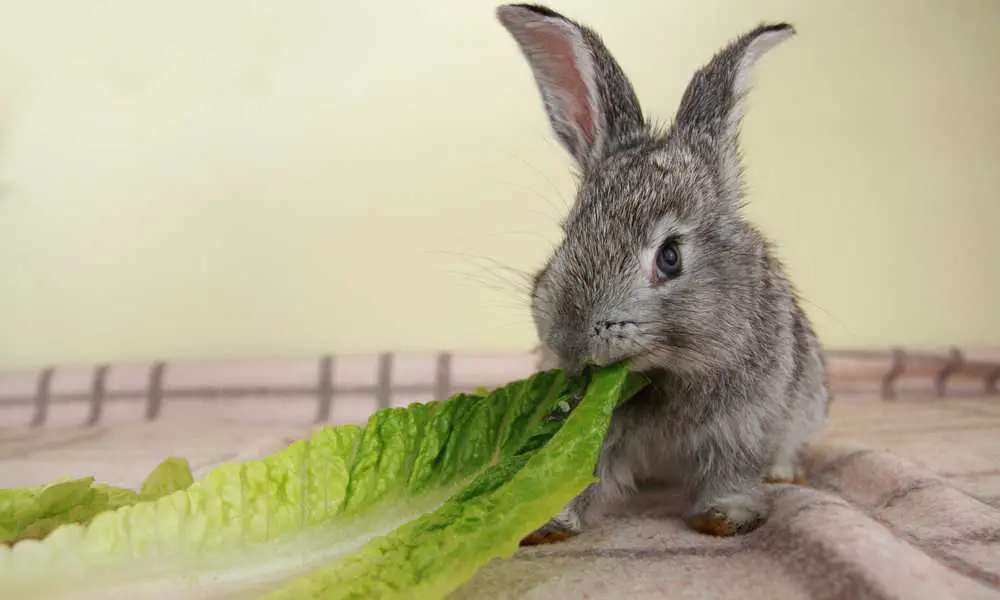
Conclusion
The question of what kind of lettuce rabbits can eat is a significant consideration for anyone caring for these delightful, furry companions. The well-being of rabbits hinges on their diet, making it essential to provide them with safe and nutritious options. Romaine lettuce, green leaf lettuce, red leaf lettuce, and butterhead lettuce stand out as suitable choices, rich in essential nutrients and fiber. These lettuces contribute to a balanced diet when introduced in moderation alongside a foundation of high-quality hay and occasional fresh vegetables. However, steering clear of varieties like iceberg lettuce, cabbage, arugula, and spinach is equally important, as these can lead to digestive discomfort or hinder nutrient absorption. Ultimately, your dedication to understanding the dietary needs of your rabbits reflects your commitment to their health and happiness, ensuring that they thrive as cherished members of your family.
Rabbits are herbivores with a unique digestive system that requires a diet rich in fiber to maintain optimal health. While lettuce can be a delightful treat for them, not all types are suitable due to variations in nutrient content and water content.Safe options like romaine lettuce provide rabbits with valuable nutrients such as Vitamin A, which contributes to good vision and immune function. The fiber content aids in maintaining healthy digestion, preventing issues like gastrointestinal stasis. Including a variety of lettuces like green leaf, red leaf, and butterhead can add diversity to their diet, promoting overall well-being.
However, moderation is key. Rabbits have delicate digestive systems, and sudden changes or excess consumption of any food, including lettuce, can lead to digestive upset. Introduce new lettuces gradually and monitor your rabbits’ reactions.It’s important to highlight that while lettuces are nutritious, they should never replace hay as a primary food source. Hay is essential for rabbits’ dental health and provides the necessary fiber to keep their digestive tracts functioning properly. Fresh vegetables, including safe lettuces, can supplement their diet.

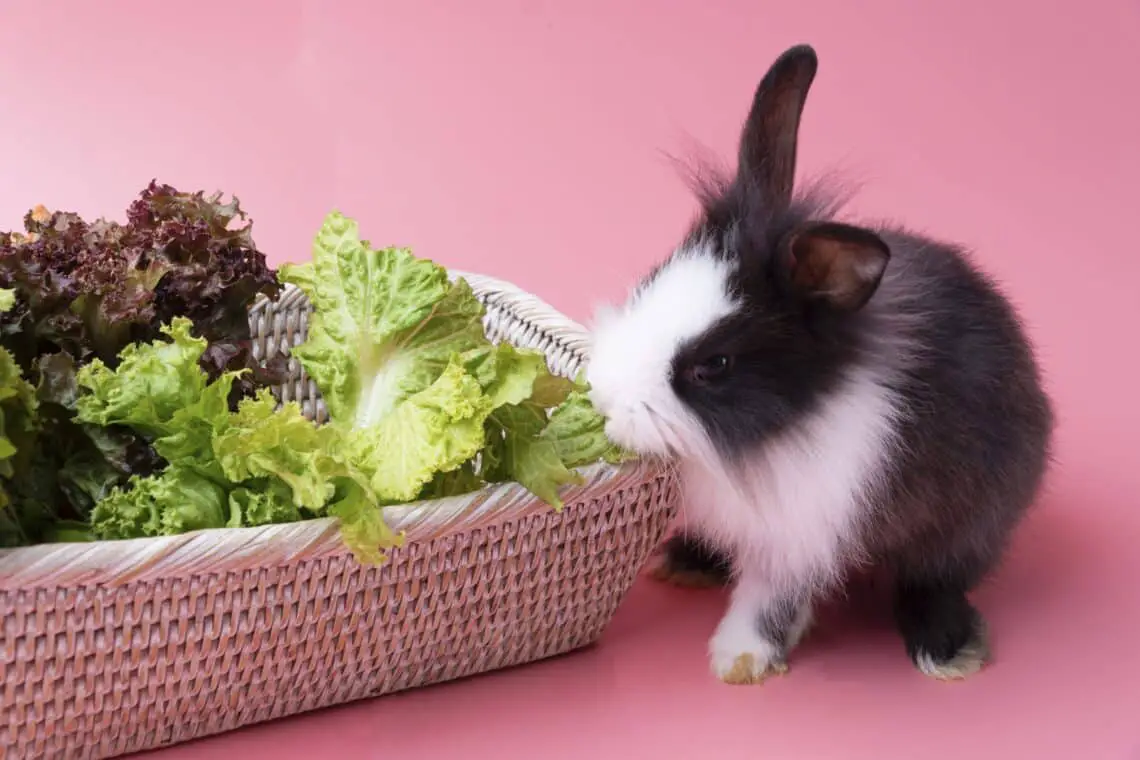
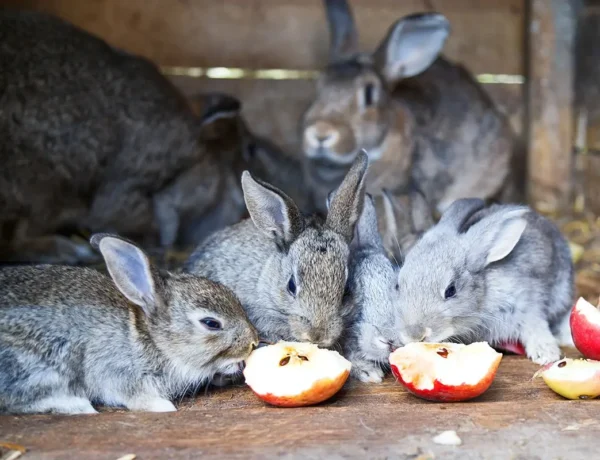
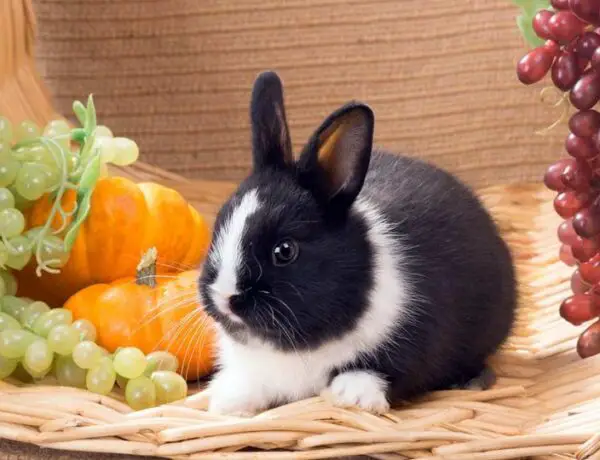
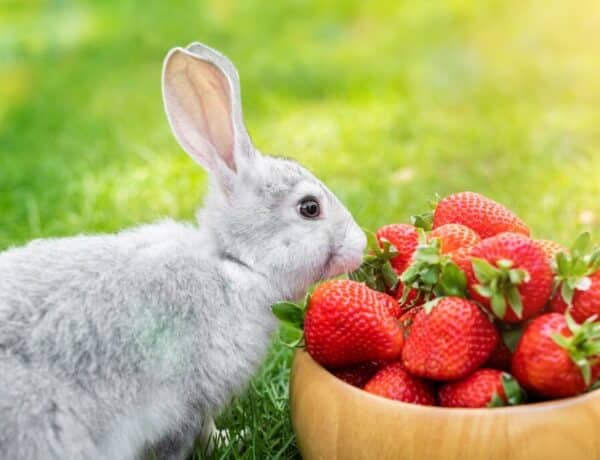
No Comments